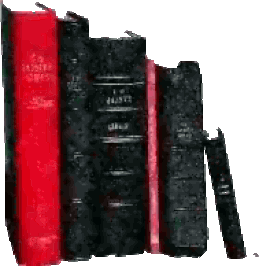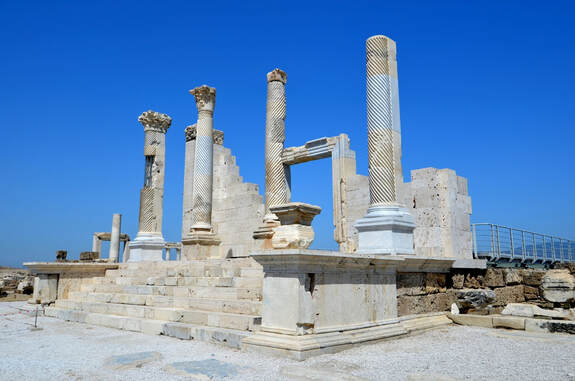Colossians 1:13-2:3 Lesson 385
Read both the "King James Bible" and the "New Living Translation."
In this lesson:
Paul's case against the Gnostics.
Jesus is our only hope.
Look for the things Jesus does
for you, and what you can do for Him.
Verses 1:15-20 are a hymn praising Jesus Christ.
In its original tongue, the hymn has a beautiful poetic rhythm.
Verses 1:21-23 explain the hymn.
Paul suffered for the church (1:24-29).
Some of the ruins in ancient Laodicea.
Where was...
Laodicea -
A wealthy city on the Lycus River seven miles northwest of Colosse (fifty miles east of Ephesus and south of Hierapolis) in the Roman province of Phrygia (the western part of modern-day Turkey). Initially called Diospolis and then Rhoas, the city was renamed by King Antiochus II (286-246 BC) of Syria for his wife, Laodice. Laodicea was a center of trade and banking and so wealthy it minted its own money. The city was also famous throughout the Roman empire for its manufacture of fine linens, cloth, and carpets. Laodicea was the richest of the famous "seven cities" and boasted an excellent medical school that produced a popular eye ointment. However, the city had a poor water supply and had to bring water in via a manmade aqueduct. Laodicea was destroyed by an earthquake in AD 60 but rebuilt by its well-to-do citizens. The city had a growing Gnostic population which threatened Christianity, and as documented in Revelations 3:14-20, the church showed a weak commitment to Christ. Paul worried about the Laodicean's lukewarm faith (Colossians 2:1). Even today, the word Laodicean refers to anyone who lacks a strong religious or political commitment.
Laodicea -
A wealthy city on the Lycus River seven miles northwest of Colosse (fifty miles east of Ephesus and south of Hierapolis) in the Roman province of Phrygia (the western part of modern-day Turkey). Initially called Diospolis and then Rhoas, the city was renamed by King Antiochus II (286-246 BC) of Syria for his wife, Laodice. Laodicea was a center of trade and banking and so wealthy it minted its own money. The city was also famous throughout the Roman empire for its manufacture of fine linens, cloth, and carpets. Laodicea was the richest of the famous "seven cities" and boasted an excellent medical school that produced a popular eye ointment. However, the city had a poor water supply and had to bring water in via a manmade aqueduct. Laodicea was destroyed by an earthquake in AD 60 but rebuilt by its well-to-do citizens. The city had a growing Gnostic population which threatened Christianity, and as documented in Revelations 3:14-20, the church showed a weak commitment to Christ. Paul worried about the Laodicean's lukewarm faith (Colossians 2:1). Even today, the word Laodicean refers to anyone who lacks a strong religious or political commitment.
Study Tip:
Use the investigative journalist's five W's technique as you study the Bible.
As you read each passage, ask yourself who, what, when, where, and why.
Use the investigative journalist's five W's technique as you study the Bible.
As you read each passage, ask yourself who, what, when, where, and why.











